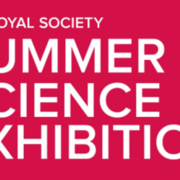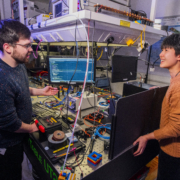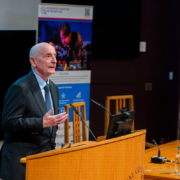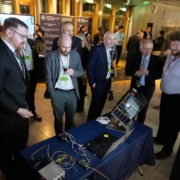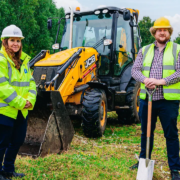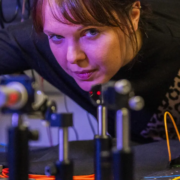This article, authored by Professor Gillian Murray, Deputy Principal for Business and Enterprise at Heriot-Watt was first published in the Edinburgh Evening News as a guest piece on behalf of the Edinburgh Chamber of Commerce on Monday 2 December 2024.
Scotland is rapidly establishing itself as a key player in the global space industry. With one operational spaceport and two more in advanced stages of development, the country is building a vibrant ecosystem of space and satellite businesses, cutting-edge research, and a highly skilled workforce.
Scotland’s space industry has seen impressive growth, with over 220 organisations generating a combined income of £298 million. By 2030, the sector aims to generate over £4 billion annually for Scotland’s economy and to increase its workforce fivefold. These targets underscore an ambition that reaches far beyond national boundaries, putting Scotland on the map within space and aerospace industries.
As we look to the future, the aerospace sector’s growth is not without challenges. Large-scale infrastructure investments and a skilled workforce are both essential to meet the industry’s demands. I believe universities like Heriot-Watt play a pivotal role here, not only in educating tomorrow’s talent, but as active partners in driving the innovation and collaboration essential for this sector to thrive. Scotland’s ambition to lead in space demands a strong alignment between enterprising academic research, industry partnerships, and talent development, and at Heriot-Watt, we’re focused on creating that alignment.
One of the most exciting advancements at Heriot-Watt is our role in the UKRI-funded Integrated Quantum Networks Hub, a £39.5 million initiative set to revolutionise data security through quantum-secure satellite and ground communication. With support from 40 industry partners, contributing nearly £20 million in additional funding, this project exemplifies our commitment to impactful, collaborative research.
This level of industry engagement underscores Heriot-Watt’s strength in building partnerships at scale, making us an ideal partner for the space industry. By connecting world-class research with robust industry collaboration, we are not only advancing the frontiers of knowledge but actively addressing the sector’s most pressing challenges.
A unique asset in our research portfolio is the Hub Optical Ground Station (HOGS). This high-resolution telescope is dedicated to quantum and photonic-based satellite communications, enabling us to explore and demonstrate secure data transfer across space. Positioned within our Edinburgh campus, HOGS sits alongside our Research Park—a vibrant, cross-sectoral environment where collaboration and knowledge sharing are at the heart of innovation.
Our Research Park is home not only to space-focused businesses but also to a diverse range of industries, from advanced manufacturing to energy and digital technologies. This diversity fosters an ecosystem where ideas and expertise can flow freely across disciplines, creating unique opportunities for businesses to draw on insights from multiple sectors. Partners benefit from access to our cutting-edge research, as well as a network of academics, students, and business leaders committed to solving complex challenges across industries, including but not limited to space.
This co-location opportunity is something we’ve already seen yield impressive results. One example is our partnership with Celestia, a global leader in satellite antenna technology. Through this collaboration, Celestia has benefited from Heriot-Watt’s expertise in antenna engineering, tapping into our research infrastructure and hiring highly skilled graduates to advance their work on multi-satellite tracking systems. This has enabled Celestia to contribute to satellite constellations that are essential for high-speed internet access in remote areas and improved environmental monitoring capabilities. The partnership not only benefits Celestia but also strengthens the broader space ecosystem, demonstrating the potential of university-industry collaboration.
The demand for skilled professionals is another critical element of Scotland’s space industry, particularly as the sector continues to grow. With STEM education at our core, Heriot-Watt has been proactive in designing programmes that align with industry needs in space and related sectors. The Scottish Science Advisory Council has highlighted the pressing need for greater collaboration between industry and academia to develop and retain a skilled workforce capable of meeting future demands. Our five Centres for Doctoral Training, focused on fields like quantum science and photonics, help create a pipeline of talent for high-tech sectors. Programmes like our Aerospace Engineering degree and Graduate Apprenticeships (GAs) equip students with the hands-on skills needed to thrive in this expanding sector, ensuring Scotland’s workforce remains competitive and resilient.
Graduate Apprenticeships (GAs) will play a crucial role in building that workforce. These programmes, which combine academic study with real-world industry experience, address skill gaps while ensuring that students can apply their knowledge directly in professional settings. An inspiring example is Fatima, one of our Graduate Apprentices in engineering, whose work for her employer resulted in a £100,000 cost savings. Fatima’s achievement highlights how GAs provide immediate, tangible value to businesses, while helping students build a practical understanding of their field. For the space industry, where continual innovation is key, GAs represent an effective way to develop a future-ready workforce.
In addition to building talent, our partnerships with the private sector provide crucial support to the growing space economy. For example, the Heriot-Watt Research Park offers co-location opportunities that give businesses access to our extensive R&D facilities and infrastructure. Celestia is one of many companies that have chosen to base operations here, where they can collaborate with our academics and tap into our skilled graduates to further their innovations in satellite technology. In a sector as specialised as space, this proximity to talent and technology can accelerate innovation and foster cross-industry synergies.
Moreover, our global presence gives us a unique advantage in bringing international perspectives and connections to Scotland’s space sector. With campuses in Dubai and Malaysia and a robust Heriot-Watt Online education platform, we connect Scotland with international insights and expertise. We regularly engage with global academic and industry leaders, and our graduates are part of a worldwide alumni network. This global outlook helps us provide a richer educational experience and expand the reach of Scotland’s space sector by building international partnerships.
As we look ahead, I see Heriot-Watt University as more than an academic institution. We are a bridge between Scotland’s ambitions and the international space community, committed to nurturing a skilled, future-focused workforce and advancing research that directly supports industry needs. But beyond supporting existing sectors, universities like ours play a crucial role in shaping the industries of tomorrow. Through our knowledge, research, and innovation, we drive the development of new fields, creating the foundational knowledge and ecosystems they need to thrive.
At Heriot-Watt, this commitment is embedded in everything we do—from collaborative projects and targeted skills programmes to shared research resources that bring together academia, industry, and emerging talent. I believe universities can be catalysts not only for Scotland’s success in space but for a broader vision of economic growth and technological advancement that positions Scotland as a leader in multiple high-impact sectors.
The opportunities for growth are enormous, but they require a proactive approach to building the infrastructure, skills, and partnerships that will enable Scotland to compete globally. Scotland is on an exciting trajectory, and universities have a central role to play in realising its potential.

